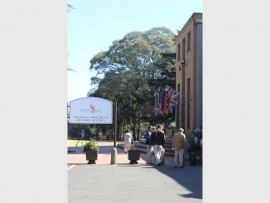Fallen heroes remembered
SAXONWOLD – Military museum remembers heroes that fell a century ago.

The Ditsong National Museum of Military History remembers more than 2 000 South African soldiers who died in 1916 during the Battle of Delville Wood.
More than a century ago, the South African brigade under Major General HT Lukin was ordered to assist the British brigade to clear the woods at Delville in France of enemy soldiers. The South Africans entered the woods on 15 July that year.
“A brigade of almost 3 000 men went into that woods and by the end of six days, only 142 people emerged,” explained Allan Sinclair, the museum’s curator.
“At the roll-call the following day, there were 750 people on parade and many bodies disappeared.”
According to Sinclair, the battle was so ferocious that more than 400 German shells fell on the forces per minute. “They endured unbelievable hardships during those six days, but they didn’t falter,” he said.
“The soldiers carried on fighting until they were relieved.”
The museum, previously known as the South African National War Museum, was opened by Prime Minister Jan Smuts in 1947. In his speech, Jan Smuts said he hoped that the memorial would remind people of the horrors, the loss of life and the devastation of war and that it served as a warning to all people to create a world in which weapons of mass destruction would never be used again.
Sinclair said South Africans need to remember and respect what took place and never forget the ultimate sacrifice of the young men. “We live the way we live today in this country because of what they did,” he said.
“Not just them, but all who went into later wars, the people who fought in the liberation struggle and never came back.”
The museum’s curator said even within the devastation and tragedy of war, it was also important to recognise the technological advancements that came about because of it, but said those advancements could never justify the loss of lives.
“Because of the rockets developed by the Germans during the Second World War, man eventually went to the moon. Medical advances were unbelievable, especially the invention of penicillin,” said Sinclair.
“Even aviation technology developed the jet engine which also came about during the Second World War and is now used as a mode of transport to get anywhere in the world. But that doesn’t make it right.”
Sinclair emphasised that the museum did not glorify war in any way, but only sought to educate the public on the rich history.
“The scars of warfare and trauma lived with survivors, so let us remember those who fought and never let it happen again.”









